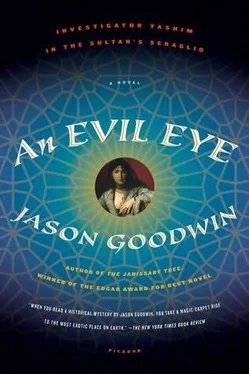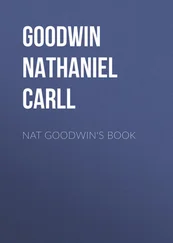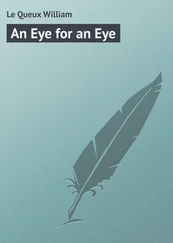Jason Goodwin - An Evil eye
Здесь есть возможность читать онлайн «Jason Goodwin - An Evil eye» весь текст электронной книги совершенно бесплатно (целиком полную версию без сокращений). В некоторых случаях можно слушать аудио, скачать через торрент в формате fb2 и присутствует краткое содержание. Жанр: Исторический детектив, на английском языке. Описание произведения, (предисловие) а так же отзывы посетителей доступны на портале библиотеки ЛибКат.
- Название:An Evil eye
- Автор:
- Жанр:
- Год:неизвестен
- ISBN:нет данных
- Рейтинг книги:3 / 5. Голосов: 1
-
Избранное:Добавить в избранное
- Отзывы:
-
Ваша оценка:
- 60
- 1
- 2
- 3
- 4
- 5
An Evil eye: краткое содержание, описание и аннотация
Предлагаем к чтению аннотацию, описание, краткое содержание или предисловие (зависит от того, что написал сам автор книги «An Evil eye»). Если вы не нашли необходимую информацию о книге — напишите в комментариях, мы постараемся отыскать её.
An Evil eye — читать онлайн бесплатно полную книгу (весь текст) целиком
Ниже представлен текст книги, разбитый по страницам. Система сохранения места последней прочитанной страницы, позволяет с удобством читать онлайн бесплатно книгу «An Evil eye», без необходимости каждый раз заново искать на чём Вы остановились. Поставьте закладку, и сможете в любой момент перейти на страницу, на которой закончили чтение.
Интервал:
Закладка:
He rang a bell.
“Send to the palace at Besiktas. Inform the sultan-wake him, if necessary-that the grand vizier has summoned the divan. A matter of urgency. His presence would be-advisable.”
Years ago-in another century, another life-Husrev Pasha had spent a summer with his uncle, driving a mule train across the Balkans. The tracks were bad, often blocked by falls of stone and scree, so that young Husrev had been sure they would have to turn back. His uncle, though, had simply stamped up to the rockfalls and let his eyes wander over the mountainside, probing the ground with his stick. “The road is blocked? Then we must turn the blockage into our road,” he used to say. Eventually he would wave his nephew to come on with the lead mule.
That was how Husrev came to Sarajevo, and was recruited into the army.
Now, as he sat contemplating this new obstacle in his way, he leaned over and cracked his huge knuckles, one after another, holding his hands close to his belly.
The fleet was gone. Out of a clear blue sky, if the lieutenant was to be believed, Fevzi Pasha had simply turned over his command to the Egyptians.
And I am an old Bosniac who fears the sea.
Husrev’s position-perhaps his very life-hung in the balance. It counted for nothing that the decision to deploy the fleet had been taken by the late sultan. Fevzi’s defection was a blow to the empire’s pride, not to mention the public purse-and it had happened on his watch.
Worst of all, Fevzi’s defection left Istanbul defenseless against an invader.
Husrev snorted through his nose, like a seal blowing air. The Russians had been here before. Who could say that they would not come again?
The Ottomans were afraid of Russia. She pressed against their borders, roamed their seas, bullied them, protected them and took her price. Russia’s designs on Istanbul itself-Constantinople, the jewel in the Orthodox crown-were an open secret.
Husrev cracked his knuckles again.
He rang the bell. His uncle was long dead. “I want to see Yashim,” he said.
Then he glanced up.
Yashim was already there.
86
Out in the roadsteads of the Sea of Marmara the cutter strained at its anchor, meeting each swirl of the current with an almost imperceptible swing of its stern. A lantern burned at its bows; another swung from a lanyard by the mainmast, describing circles that slid shadows across the decks. Now and then a mast creaked, and the rigging gave a soft boom whenever the wind died.
The lieutenant had not yet returned when an oar splashed close to the ship, followed by a low whistle.
A rope ladder dropped from the cutter’s side, and the approaching caique slid into the deep shadow beneath the rail.
A man moved out into the light on deck. He was visible only in silhouette, and then the lantern took its turn and the darkness dropped and the man disappeared into the dark, taking the ladder rung by rung.
An oar scraped against the wooden hull of the cutter. The rigging hummed in the breeze, and the caique’s hull hissed against the current. It was barely a sound; and the oars dipped noiselessly into the water.
When the lamplight circled to the rail again, the deck was as empty as before.
87
“ Come in, Yashim.” The grand vizier tossed his papers aside and sat staring at Yashim. “Very bad news.”
“Fevzi Ahmet Pasha has stolen the fleet.”
Husrev raised his eyebrows. “You’ve heard? But I myself have only received the news in these last few minutes.”
“According to the Jesuits, the Kapudan pasha sailed to Egypt and handed the fleet to the khedive,” Yashim said. “They have a network.”
The old vizier closed his eyes. “Do you or the Jesuits know why?”
Yashim hesitated. He was no longer bound by his sense of honor, now that Fevzi Pasha had defected. “In Saint Petersburg, ten years ago, he gave Batoumi away. At the time, I thought he had made an error of judgment. Now I’m not so sure.”
“You think he took a bribe?”
“It’s possible, isn’t it?”
The grand vizier cracked his knuckles together. “Possible. Possible. I should have seen it coming, Yashim, when his dispatch failed to arrive. You should have told me. Who knows what Fevzi Pasha may do for them? Who controls the destiny of the empire, if not the Russians? For a century, they have pushed us farther and farther back. On the Black Sea. In the Balkans. The Greek debacle was a Russian affair.”
“And the Russians benefit from this defection, too.”
“The Russians?”
“The Egyptians gain a fleet-and can contemplate an attack on Istanbul, if they dare to make one. But that wouldn’t be certain. In the meantime, with Istanbul defenseless, Fevzi’s defection gives the Russians an excuse to offer us their protection, as they did before.”
“We can hardly refuse, in view of the Egyptian threat,” Husrev Pasha growled. “We have no fleet. It seems that Fevzi Pasha has played the sides against the center-his defection leaves us with no choice. It seems we must call on the Russians.”
“Just as they intend,” Yashim objected.
“What choice do we have?” the grand vizier interrupted. “We called on them before. They came-and they left. Perhaps they will do so again.”
Yashim shook his head. “Last time we had a fleet, and Mahmut was sultan. Our request for protection took the Russians by surprise. This time, we’re playing into the Russians’ hands. Galytsin has been planning this for some time.”
He thought of Fevzi Pasha’s empty house-the house of a man scaling down; preparing to cut loose. It was so obvious now. He should have understood-it fitted with the Russian papers, the missing report.
The old vizier took a deep breath. “The longer we wait, the weaker we will become. The Egyptian fleet cannot move until the spring. If we talk to the Russians now, we can still negotiate, ask for guarantees. By springtime, we will be talking with a loaded gun at our heads.”
Yashim made no reply. The old pasha was not talking to him-he was merely thinking aloud.
The image that arose in Yashim’s mind was of the tutor at the palace school, stuffing his beard into his mouth.
“Give me two days.”
Husrev Pasha glanced up. “Two days?”
“Before you speak to the Russians.”
Husrev Pasha stared at him. “I must talk to the sultan, and to the viziers. I’m afraid I cannot see what you can do, Yashim efendi. But two days?” Something like a smile appeared on his fleshy lips. “Very well.”
88
The village of Ortakoy straggled out to nothing in a few hundred yards. Spiked with the wintry stems of Judas trees and hibiscus, the cliffs advanced toward the shore, and Yashim could see the road climbing its flank, deserted except for an unlit bullock cart that strained noiselessly against the gradient, laden with broom from the upper slopes.
He pushed on down the track. Certain details returned to him: the angle of a tree hiking its branches above the water; a tilted Roman milestone half sunk in furze; a long view of the Bosphorus where it slipped away between two promontories, Asian and European, etching the outline of the castle at Rumeli Hisar against the gray sky.
He had forgotten the little row of fishermen’s shacks opposite the yali. They were built of wood and tile, single-story houses resting on massive foundations of uncut stone. Their view of the Bosphorus was uninterrupted, over the sunken wattle wall and the lurching gateway where he had said goodbye to Fevzi Ahmet years before, and shivered in his furs.
The yali itself was gone. Yashim pushed against the wooden gate, overgrown with the brown tendrils of a summer past; he shoved with his shoulder and felt the grasping shoots break as the gate slowly wheeled back.
Читать дальшеИнтервал:
Закладка:
Похожие книги на «An Evil eye»
Представляем Вашему вниманию похожие книги на «An Evil eye» списком для выбора. Мы отобрали схожую по названию и смыслу литературу в надежде предоставить читателям больше вариантов отыскать новые, интересные, ещё непрочитанные произведения.
Обсуждение, отзывы о книге «An Evil eye» и просто собственные мнения читателей. Оставьте ваши комментарии, напишите, что Вы думаете о произведении, его смысле или главных героях. Укажите что конкретно понравилось, а что нет, и почему Вы так считаете.












